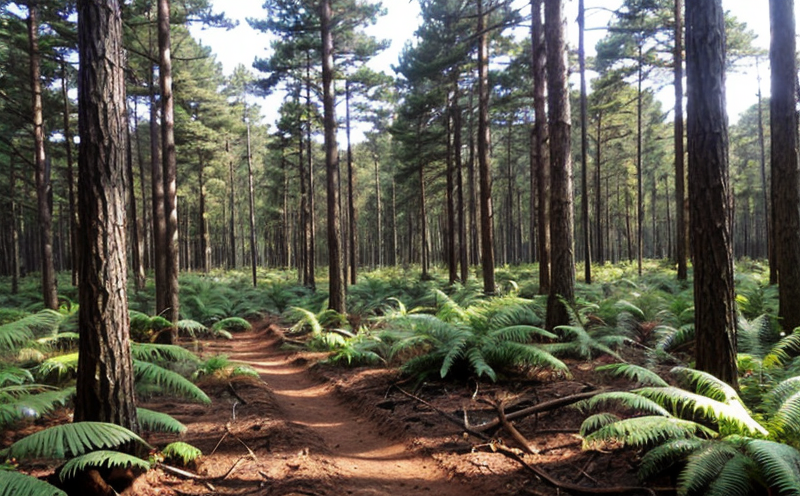Soil Fungal Diversity Assessment
In agriculture and forestry testing, soil fungal diversity plays a crucial role in determining ecosystem health, productivity, and resilience to environmental stress. Soil fungi are essential components of the rhizosphere, influencing plant growth through nutrient cycling, disease suppression, and enhancing water and nutrient uptake. Accurate assessment of soil fungal communities is vital for sustainable agricultural practices and forestry management.
Soil fungal diversity can be measured using various methods including DNA-based techniques such as sequencing, cultivation-independent approaches like metagenomics, and culture-dependent methods where fungi are isolated and identified based on morphological characteristics. Each method has its advantages and limitations depending on the specific research objectives or regulatory requirements.
For instance, high-throughput DNA sequencing allows for comprehensive profiling of fungal communities but may be costly and labor-intensive. In contrast, cultivation methods provide detailed insights into individual species but are often less sensitive to low-abundance taxa. The choice of method depends on the desired resolution, cost considerations, and whether specific fungi need to be identified.
At Eurolab, we employ a multi-faceted approach combining advanced molecular biology techniques with traditional cultivation methods to offer clients an accurate assessment of soil fungal diversity. Our services include DNA extraction, library preparation, sequencing on state-of-the-art platforms like Illumina or MiSeq, bioinformatics analysis using software such as QIIME2, and final interpretation by our experienced scientists.
Our experts ensure that all samples are handled according to strict protocols to maintain sample integrity. This includes immediate cooling upon collection, avoidance of cross-contamination during processing, and appropriate storage conditions for long-term preservation. Post-processing, we provide detailed reports highlighting dominant fungal genera, rarefaction curves, Shannon index estimates, and other relevant metrics.
Understanding soil fungal diversity is not only beneficial for academic research but also essential for practical applications in agriculture and forestry. For example, identifying pathogenic fungi early can prevent crop losses while promoting beneficial interactions between plants and their associated microflora can improve yields. By providing reliable data on soil fungal composition, Eurolab supports informed decision-making processes aimed at enhancing productivity without compromising ecological balance.
- High-throughput DNA sequencing
- Culture-dependent methods for detailed species identification
- Metagenomics analysis to understand community structure
- Detailed reporting including rarefaction curves and Shannon index estimates
Eurolab Advantages
At Eurolab, we pride ourselves on offering unparalleled expertise in soil fungal diversity assessment. Our team of highly qualified professionals brings together years of experience across diverse fields including microbiology, molecular biology, and environmental science to deliver accurate results consistently.
- Comprehensive expertise: Our scientists specialize in both theoretical knowledge and practical application ensuring reliable outputs
- State-of-the-art facilities: Equipped with cutting-edge equipment such as next-generation sequencers and advanced bioinformatics tools
- Industry-leading standards: Adherence to international norms like ISO 14695 ensuring our methods meet highest quality benchmarks
We take pride in delivering personalized service tailored specifically towards client needs. From initial consultation through final report delivery, every step is meticulously planned and executed ensuring satisfaction from start to finish.
Customer Impact and Satisfaction
Our clients benefit greatly from Eurolab's specialized soil fungal diversity assessment services. By understanding the composition of fungi within agricultural or forestry soils, they can make more informed decisions regarding management strategies that promote sustainable practices while minimizing negative impacts on natural habitats.
Customers report increased confidence in their decision-making process knowing that they have access to robust scientific evidence supporting their actions. This leads to improved productivity levels and reduced risk of environmental degradation associated with improper interventions.
Evaluation of soil fungal diversity helps identify potential areas for improvement within existing operations or planning new initiatives aimed at enhancing overall efficiency and sustainability goals. For example, insights gained from our assessments have assisted numerous organizations in developing targeted intervention plans designed to restore degraded ecosystems or optimize resource utilization effectively.
International Acceptance and Recognition
- The European Union mandates compliance with ISO standards for soil quality assessment, which includes accurate identification of fungal species
- Australia follows similar guidelines outlined in AS/NZS 4456 series regarding soil testing procedures incorporating DNA-based approaches
- United States Environmental Protection Agency (EPA) recognizes the importance of understanding soil microbial communities including fungi when evaluating land use changes
Eurolab's methodologies align closely with these international standards ensuring that our clients receive globally accepted results. This global acceptance enhances credibility and facilitates easier cross-border collaborations.





